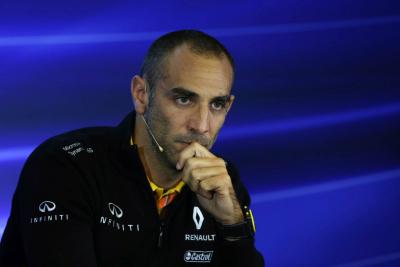Renault labels F1 2018’s engine limit a “headache”
Formula 1’s new three-engine limit will present teams with a “headache” for the 2018 season, according to Renault’s Cyril Abiteboul.
In a bid to reduce engine costs and push more economically-friendly developments, each driver will only be permitted three MGU-H, turbocharger and ICE units for the entirety of the 2018 season before incurring penalties, while only two MGU-K, control electronics and energy store components will be allowed.
Formula 1’s new three-engine limit will present teams with a “headache” for the 2018 season, according to Renault’s Cyril Abiteboul.
In a bid to reduce engine costs and push more economically-friendly developments, each driver will only be permitted three MGU-H, turbocharger and ICE units for the entirety of the 2018 season before incurring penalties, while only two MGU-K, control electronics and energy store components will be allowed.
The move has received a backlash of criticism given the calendar has been increased back to 21 races. Red Bull chief Christian Horner labelled the decision “absolutely barking mad”, but Abiteboul believes a late change to the rules could yet be agreed between teams and the sport’s hierarchy.
"It's a headache but it's a known headache," Abiteboul told Sky Sports News. "We knew that it was coming so we have built our plans and strategy accordingly. Right now there is nothing to indicate that we can't stick to this plan.
"Having said that, I still don't believe it's the right thing for Formula 1 and will still have another go [to change it] in the upcoming discussions with FIA and FOM and other teams because I don't think it really makes sense for anyone.”
Over 700 grid penalties were dished out in 2017, the majority of which were racked up by Renault and Honda powered cars. However, in a move to simplify the rules and avoid similar scenarios to last season, F1 has capped grid drops to 15 places, with anything higher incurring an automatic demotion to the back of the grid.
F1 will also introduce the controversial Halo cockpit protection device this year, following two years of on-track evaluations. Abiteboul said Renault is currently in the process of determining the best way to incorporate the mandatory system onto the team’s 2018 challenger, which will be unveiled on February 20.
"We find it heavy and not very nice aesthetically but we have talked about that. The decision is made, it's necessary from a safety perspective and things need to evolve. I guess there will be more attempts to do that in a more refined manner but for the time being we are trying to integrate it in the best way possible."











